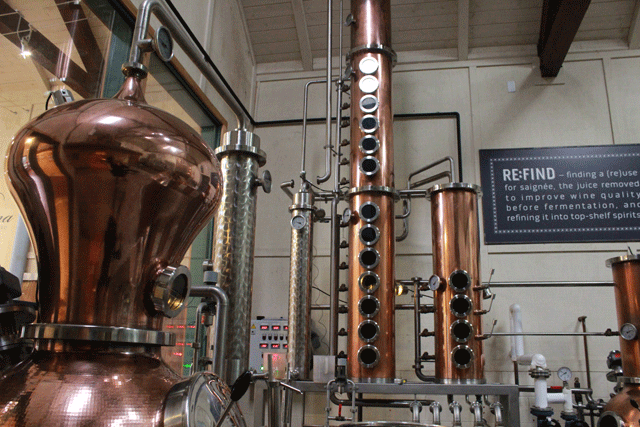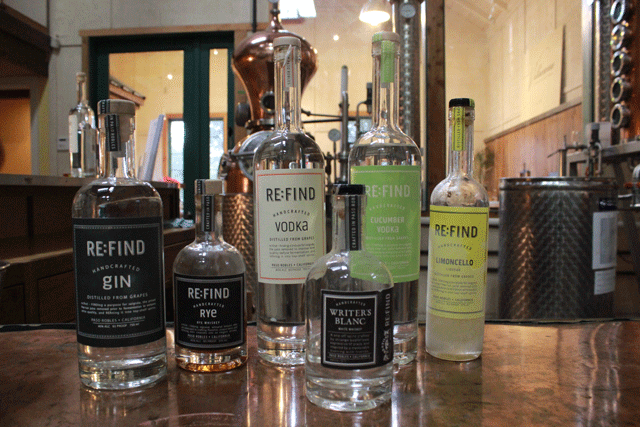Craft distillery industry is growing in Paso Robles

These are two of RE:FIND Distillery’s stills next to Villicana Winery’s tasting room. Photo by Heather Young
Local production of vodka, gin, whisky and bourbon growing
The craft spirit industry in Paso Robles has exploded over the last few years with more wineries starting to distill. “It’s actually a really good complement to the area,” Paso Robles Wine Country Alliance Communications Director Chris Taranto said. Though he said it doesn’t expect to see the same tourism draw with craft distilleries as the wineries have done, he said it’s another enticement to bring people to Paso Robles, along with craft beer, farm visits and farm stays.
Currently, Taranto confirmed, there is a short list of craft distilleries in Paso Robles:
- RE:FIND Distillery, at Villicana Winery & Vineyard
- Red Soles Stillhouse, at Red Soles Winery
- Pendray’s Distrillery, at PasoPort Wine Company
- Krobar, at Grey Wolf Cellars and Silver Horse
- Opolo Winery
- Wine Shine, at Turtle Rock Vineyards
- Bethel Rd. Distillery, Winery and Public House, by Castoro Cellars
“There are probably a few others out there looking into it — we just don’t know it yet,” Taranto said, adding that getting permitted and licensed for a distillery is a slow process, one that many of the distillery owners confirmed.
Paso Robles’ first distillery, RE:FIND, was launched by Villicana Winery owners Alex and Monica Villicana wanting to find a way to use the free run juice that was just going down the drain.
“It came out of the desire to become more sustainable in our winemaking practice,” Monica Villicana said, adding that free run juice is removed before the red grapes are pressed for the wine. “It was painful for us to see all that juice just be discarded. … We found a new use for this prized juice.”

These are some of the spirits produced at RE:FIND Distillery in Paso Robles. Photo by Heather Young
Monica said that the production of spirits for Re:Find have been increasing every year. Re:Find produces 2,000 cases of vodka, gin, limoncello, cucumber gin, rye whisky and bourbon.
“It’s definitely taken an uptick in this area, which is really exciting,” Monica Villicana said, adding that the young culture is full of cocktail drinkers, bringing back cocktails from the 1940s and ’50s. She said that a lot of their food-savvy clientele are in the 30- to 45-year-old age group and don’t want to drink what’s forced on them, rather focus on local, organic food.
Red Soles Stillhouse is about to release its second batch of limoncello, which sold out in a month and a half after its first release in spring 2014. It also produces an unaged brandy called California Hootch.
PasoPort started distilling about a year and a half ago, said Lola Glossner, who owns the winery with her husband, Steve. The distillery has been part of the Glossners’ business plan since the beginning, “because we make port, we use brandy in all our ports.”
While PasoPort has been producing unaged brandy to use in the ports, it has not yet released a brandy for the public. That will also change when it releases its viognier brandy, barrel-aged in white port barrels for 12 months, which Glossner said they’re getting ready to do. The aged-brandy will be released under the brand Pendray’s Distillery. It will also produce a grappa, which is made from the skins, pulp, seeds and stems left over pressing grapes for winemaking, and plum liquor, for which local plums are soaked in brandy.
“The brandy we make to drink is made from wine,” Glossner said. “It’s the same way they make brandy in the Cognac region of France, and other countries.”
She added that Paso Port uses its free run juice to make the fortification brandy to make ports.
“It’s kind of fun because we have these different distilleries in this area and we’re all making different things,” Glossner said.
Luke Udsen of Castoro Cellars said his father, Neils, had been wanting to produce grappa because he used to live in Italy and experienced it there. For several years, Udsen said, they’ve been experimenting with grappa and brandy. Recently, the Udsens purchased Veris Cellars on Bethel Road and are converting it into Bethel Rd. Distillery, Winery and Public House, which will house the distillery and produce small batches of wine. Udsen said he is optimistic that the public house will be open to the public by summer.
“I think it’s kind of starting out like the wine industry did,” Udsen said. “It’s the Wild West … it’s kind of ‘learn are you go.’ A lot of the laws are tricky. It’s a growing market, like craft beers are taking off. I think we’re going to see it grow rapidly once there are a few more established spots.”
Joe Barton of Grey Wolf Winery and Steve Kroner of Silver Horse started their distillery plan four years ago.
“We just have an affinity for spirits — especially whiskey and gin,” Barton said. Their distillery — Krobar — will focus mainly on whiskeys. Some of the whiskeys were produced in Kentucky and aged in Paso Robles and some are made in California. “Our idea is to have both a California and a Kentucky whiskey.”
While Krobar’s whiskeys are not grape-based, it will produce gin with white grapes.
“We spent a lot of time doing research and doing a lot of traveling,” Barton said, adding that the distillery is not based on the idea that they have extra wine that they’ve been finding a use for, but rather their love of whiskey.
Barton said that the distilleries are all producing different spirits using different processes. “There’s more spirits than you could possibly imagine,” Barton said about the possibilities of the local craft spirit industry. He said he anticipates law changes in California that would allow for craft spirit producers to sell direct to consumers, something that is not allowed at this point. They are allowed, as RE:FIND does, to sell grape-based spirits, but the label must reflect it. RE:FIND uses a different label for its product sold wholesale.






















